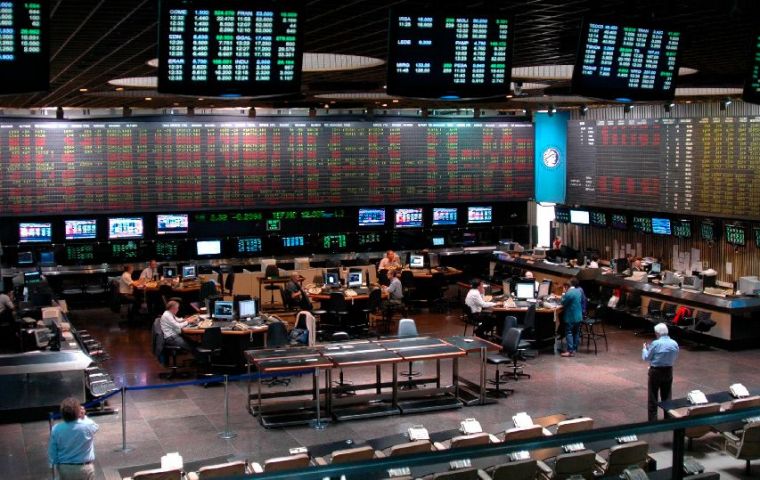MercoPress. South Atlantic News Agency
Stocks up 6% and the Peso stabilized following MSCI upgrade of Argentina
 The local Merval stock index closed up 6%, led by industrials and banks. Investment bank Grupo Financiero Valores led gains, rising 18.3%
The local Merval stock index closed up 6%, led by industrials and banks. Investment bank Grupo Financiero Valores led gains, rising 18.3% Argentine stocks surged on Thursday after index provider MSCI upgraded the country to its emerging markets index a day earlier, a respite from months of dismal economic news for market-friendly President Mauricio Macri. The local Merval stock index closed up 6%, led by industrials and banks. Investment bank Grupo Financiero Valores led gains, rising 18.3%, while aluminum producer Aluar rose 13%.
Before Thursday's gains, stocks had been negative on the year, damaged by downward revisions to the country's growth forecast as the central bank tightened monetary policy to fight inflation running at higher than 25% annually and to stem a run on the peso currency.
The central bank sold US$ 100 million in the first of 75 planned daily auctions at an average price of 27.40 per U.S. dollar. The peso later closed trading at 27.52 per dollar, up 1% from the prior session's close and well up from record-lows touched last week.
The upgrade means funds that track the emerging markets index will now be able to invest in foreign-listed shares of Argentine companies. The Global X MSCI Argentina exchange-traded fund, which is composed of that index, was up 1.7% at $28.96 as of 5:20 p.m. local time (2020 GMT).But local stocks, as well as other Argentine assets, were benefiting from improved sentiment.
Argentina's country risk - a measure of the spread between its bond yields and those issued by other governments - was down 13 points. Treasury Minister Nicolas Dujovne said on Wednesday that the MSCI upgrade would lower the country's borrowing costs.
Analysts said the upgrade could also revive the pipeline of initial public offerings (IPOs) of Argentine companies, which had been dormant since volatility derailed planned listings earlier this year. The top shareholder in small cap oil company Madalena Energy said the move “bodes very well” for its planned listing on the Buenos Aires bourse.




Top Comments
Disclaimer & comment rules-

-

Read all comments“amid inflation, increased unemployment, capital flight, fiscal deficit, etc.”
Jun 26th, 2018 - 05:31 pm 0Somewhat selective collection of measures there without any data. So let is take a look at tradingeconomics.com/argentina and address each of your claims:
Inflation: Yes, this remains high but apart from a recent blip upwards it actually looked to have plateaued. I'll give you that one. +1
Increased unemployment: The unemployment rate is very seasonal but comparing the year-on-year numbers (which is the only way to make a fair comparison) actually shows a consistent trend of decreasing unemployment. So, your claim on that one is incorrect. -1
Capital flight: Yes, the capital flow showed an increasingly negative trend but the most recent data shows a smaller number. Is this a blip or an indication of a reversal of the trend? Too early to tell, but I'll give you that one too. +1
Fiscal deficit: The government budget as a % of GDP is negative but shows a clear decreasing trend so I'd argue that you are wrong on this one too. -1
So 50% correct on your statements and you fail to mention other economic factors, for example:
GDP growth rate: Positive and appears to have plateaued at +3.6-3.9%
Capacity utilization: Clear increasing trend.
Corruption index: Clear increasing trend.
So some things are looking clearly better. Some economic indicators are more responsive than others.
I agree that maybe Macri should re-think his approach (which should be an ongoing activity) but not change policies that are working.
After closing its agreement with the IMF, the Macri government plans to continue on the same path it has been since taking office.
Jun 23rd, 2018 - 05:46 am -2So far Macri has indebted Argentina by more than $100 billion US dollars--amid inflation, increased unemployment, capital flight, fiscal deficit, etc.
As they say, it's asinine to keep doing the same and expect different results.
Rendez-vous here when the $50 billion run out.
Commenting for this story is now closed.
If you have a Facebook account, become a fan and comment on our Facebook Page!